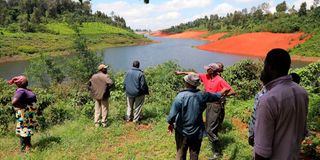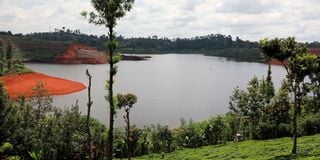Poor millionaires: Puzzle of Kiambu village that received dam millions

Some of the residents of Githang’a village in Kiambu County look at a section of Karimenu II Dam on May 8.
The villagers had signed the papers in hushed tones.
None of them knew what the other had received as payment for the land sold to the government to build the Karimenu II dam in Gatundu North, Kiambu County.
But on this day, brought together by their frustration and anger, the figures were spoken aloud, with passion and pain.
A 2012 feasibility study and master plan to develop new water sources for Nairobi and satellite towns recommended the Karimenu II dam as a source of water for residents of Ruiru, Juja and neighbouring areas.
The contract was signed in 2014, and information from the Athi Water Works Development Agency (AWWDA) website shows that it is being implemented on an EPC-F basis by a joint venture between M/s AVIC International Holding Corporation (AVIC) and M/s Shanghai Municipal Engineering Design Institute (SMEDI), with financing from China Exim Bank and Kenya.
Construction began in 2019 and was completed last year, with the official opening by former President Uhuru Kenyatta on Monday, August 1, 2022.
When the government first mooted the idea of building the Sh24 billion Karimenu 2 dam in Gatundu North, Kiambu County, it was met with mixed reactions.
Some people in Githang'a village, which forms Phase 11 of the project, saw the opportunity as a windfall to mint millions from the government as compensation for evicting them and paving the way for a multi-billion dollar project on 600 acres. But others were worried about leaving their ancestral land.
"Some people started trading in fear. They told others in all sorts of ways that we can't fight the government," says Roseline Wanjiru, 56. In the end, they all gave in but ended up as poor millionaires.
Enestina Njeri, now 89, sits thoughtfully outside the semi-permanent wooden house that has been her sanctuary for decades. Wrapped in layers of warm clothing, she struggles to take part in the conversation. Age has taken its toll, leaving her with a hearing problem.
Unspoken threat
In 2019, the mother of 10 is among those who have sold part of their land to the government. Her daughter, Roseline Wanjiru, explained that only 0.059 of their 0.601 hectares were left.
Now it wasn't just the biting cold that was bothering her, but also the threads of fear in her mind. The distance of the dam from her home carries an undertone of trepidation and an unspoken threat.
"We are desperate to move her because we are afraid that if it continues to rain heavily as it has in the last few days, she will get sick and the water will eventually come here. But what she received as compensation is hardly enough to buy land elsewhere, let alone build," she offers.

A view of Karimenu II Dam in Gatundu North in Kiambu County pictured on May 8, 2023.
Juvenalis Gitau, a 64-year-old father of four, says he is poorer than before, even after receiving Sh700,000 for 0.14 hectares of his land.
"I had planned to buy another shamba, but with the skyrocketing prices and other pressing financial needs, I started taking bits and pieces and by the time I finished, there was nothing left," he offers.
The story is the same for James Kamau. Theirs was family land, but after handing over 6.8 acres to the government in 2021, they were supposed to receive Sh5.3 million as compensation, but the family is yet to receive the money.
"The land is embroiled in a court case and we were told that payments could only be made to the holder of the title, my grandfather. He died in 1965 and we cannot afford to file an inheritance case and have the title deeds in our names. My grandfather had more than one wife, which complicates the matter. Even so, the land we sold to the government had coffee trees and pineapples, but we sold it at a poor price for fear of losing everything. We are now left with four acres,'' Mr Kamau laments.
Nothing to show
Daniel Kimani, 54, a father of three and a resident of Githang'a village, told the Daily Nation that even after selling 0.3 acres for Sh3 million, he had nothing to show for it. "Our land was family land and we're five brothers and sisters. When we got the money, it didn't even make sense to divide it among us. We could only buy a 50 by 100 plot.
Ann Njeri, 48, a mother of four, is furious. When her family sold their 0.3-hectare plot for Sh3 million, they were hoping to get somewhere else nearby to call home.
"We didn't want to live far from here because this is our ancestral home. But the land agents have taken advantage by increasing the price of the land, making it difficult for us to afford the same value we had. We ended up buying 50 by 100 plots for more than two million shillings," she says.
Stephen Kamau, 57, a father of four, found himself in the same predicament after selling 0.5 hectares of his land for Sh4.1 million. He admits that he was left with nothing after spending Sh3.1 million to buy a piece of land in the same area.
"I am worse off than before I sold our ancestral land because what I bought is unproductive and access to water for irrigation is a big problem. I regret having given up part of my land," he says.
Desperation is evident throughout our interviews with most of the people who sold land to the government and hoped to buy land in neighbouring villages.
"Although we received financial training on how to manage the money, there was nothing left to manage to buy another shamba of even less value," offers Njeri.
Now they are appealing to the government to buy the rest of the land so they can move elsewhere. But even as they wait, danger lurks. The dam that cuts through the villages is unfenced and they claim that some residents, including children, have died trying to fetch water from the dam, which is 200 metres deep in some areas.
But in a telephone interview with the Daily Nation, Athi Water Works Development Agency chief executive officer Engineer Michael Thuita refuted the claims, claiming there have been no accidental deaths.
No accidental deaths have been reported but there have been cases of deliberate suicide," Mr Thuita told the Nation yesterday.
The National Land Commission (NLC), which facilitated the land purchase, had not responded to Nation enquiries by press time.






